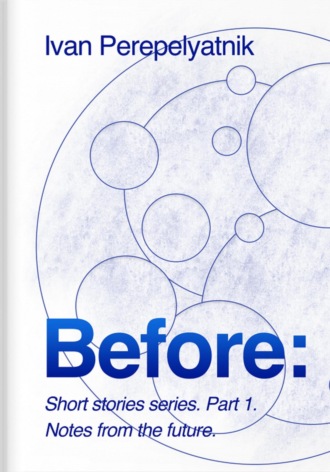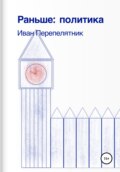
Иван Перепелятник
The Before Short Story Series. Part 1
‘Yeah, if we are lucky’, Tonya giggled nervously. ‘If we're lucky, we won't talk.’
‘Listen, with such an attitude’, Gleb turned to Tonya, ‘better not go there at all.’
‘Gleb, you really did a great job’, Olga interfered to stop the next verbal fight and a heated discusion in the bud. ‘I read the script you sent, all your notes and references. Really, well done! Everything just to the point.’
‘Thanks!’ Gleb smiled. ‘I really hope that we will outplay Tonya’s Murz!’
They all burst into laughter.
‘Okay, Tonya,’ Gleb continued, trying to set his camera somewhere. ‘We need to work out the first part—the introductory words about the history of Cheremkhovo.
‘Take one!’ Gleb declared somewhat solemnly.
Tonya fidgeted in her chair, fixed up her hair and began the story.
‘Hello everyone! Today our whole team—Olga, Gleb and myself—are going to Cheremkhovo to the abandoned mines. As for now we have already covered about half of the way to the town, located about 19 miles from Irkutsk. Underground transport highways in the direction of Cheremkhovo are yet not operational, so we make use of a good old electric car for our journey. This means that the travel time will not be measured in minutes, as many of you are used to. I must admit, the road to the town is not in the best condition. So don't be surprised—the car can sometimes shake a little on bumps. We should be there within half an hour.’
‘Cheremkhovo will soon turn 400 years old, friends,’ Tonya continued. ‘For many years, the city had been living only on coal mining. But since the middle of the 21st century, mining had stopped, which further added to the pressure on its economy. The decline in population, unfortunately, continued. Now about ten thousand people live in Cheremkhovo. Today, the main income for citizens is from two sources. The first one is tourism. Many tourists coming to relax at our unique Baikal resort, known all over the world, are interested in seeing the other side of life. The open-pit mines of Cheremkhovo, where coal mining has been carried out for about 200 years, make a strong emotional impression. Coal mines, like bleeding scars and ulcers on a live body, are a clear demonstration of of how difficult the ecological situation in the region used to be. If you take a bird's-eye view high from the sky at the entire mining quarry, a complete picture of the damage to the ecological balance caused by man at the time appears. These are such complex routes—walking and flying around the site—that local guides practice, entertaining tourists. They say that this program is very popular and well-paid.’
Tonya stopped, ‘Gleb, won’t this be too much—‘bleeding scars and ulcers on a live body’—isn’t it too eloquent a description? There are yet no such scars there.’
‘Tonya, first look into literature, the history of the town, archive documents. I have prepared thoroughly—the text is based on proven facts. There’re no my devices here,’ Gleb insisted on his line. ‘You’d better keep moving, come on. We have absolutely no time left before we get to the city.’
‘Mining at Cheremkhovo had been stopped long ago’, Tonya continued the story, looking into the camera. ‘Thermonuclear ITERs provide new energy for the world, as an inexhaustible source of modern power and potential for industry and economy. But much more interesting for our story is the second source of income for citizens. About 15 years ago, a new high-tech production of capsules for Trackers was launched in the city. Yes, of course, you are right, those same Trackers or identity passports, the unique chips that identify a person, tracking bio-activity indicators, and which also provide a preventive security function. It is important to emphasize, please don’t be confused, we are not talking here about production of all the complex inner filling for the Tracker—only about its shell. We note right away that although this is a shell of a chip, it is not less complex or sophisticated because of this. Just imagine—the entire range of capabilities of this device has to function reliably in the human body for at least 300 years. Life expectancy at the beginning of the century has reached 200 years. Our contemporary supercentenerians, who get listed in the Guinness Book of Records, live up to 220–230 years. Three centuries is exactly the lifetime of the Tracker as drafted by the designers. Such a chip in my body has been functioning for more than 20 years. Guys, imagine what a critically important element this shell is!’
‘The paradox of this story is this.’ The camera switched to Olga. ‘On the one hand, the regional authorities, stimulating the economy of Cheremkhovo, have launched the production of capsules for Trackers. This is an excellent investment, help for residents, new jobs, taxes to the budget, employment possibilities. Nothing to lose, a world to gain! At the same time, there are rumors that it is in Cheremkhovo, not far from the city, that one of the communities of renegades or, as they are also called, divergents is located. And as you know, divergents are those who reject new opportunities offered by modern infrastructure of the economy, a new quality of life, access to which is possible due to the integration of the chip into the human body even before birth. Tracker is the key to everything! From the monthly minimum social allowance for a citizen of the Republic, to the opportunity to get to the lunar colony. Unless, of course, you are very lucky, or you are very rich, or you are directly related to the scientific programs under development on the Moon.’ Olga smiled and continued. ‘In order to safely hide themselves from the PAX system—and divergents view it as one of the greatest evils of modern life, which deprives us, as they believe, of the right to be individuals, to choose, to destiny and life itself—they have to look for nooks, remote places to carry on life.’
‘Olga, but don’t they have to earn for their living somehow, to buy food, clothes, and anything else necessary?’ Both girls were already on the camera.
‘That's right, Tonya. Nowadays, it is difficult to live without a digital identifier, to say the least. The reason for choosing Cheremkhovo, as we understand, is not accidental at all. In mines or open pits, in an abandoned industrial zone, there may be laboratories, some production lines or workshops where people can work, almost invisible to the world.’
‘Olya, it doesn’t work out somehow. How can it be that we have heard about divergents in Cheremkhovo, and the
all-seeing PAX is not aware of what is happening under its nose. It's hard to believe such a story!’
‘This is our main goal for today, Tonya, to understand how really things are in Cheremkhovo, what is happening there, who works, how divergents live, if there are at all.’
‘Great! Filmed! Well done, Tonya, Olya! Camera, stop!’ Gleb gave instructions.
The Signal of the System
Alexey was walking quickly along the brightly lit, seemingly endless corridor. On both sides of it, at regular intervals on each door leading to the offices of employees, there were screens displaying department numbers, first and last names. Alexey looked at his watch. ‘Pulse 115. Need to calm down. Sergey Semyonovich would not stand weakness. And being nervous is definitely not a manifestation of strength.’ He stopped abruptly and began to take short breaths, leaning against the wall, ‘Inhale-exhale, inhale-exhale. Everything is fine. I'm good. Inhale-exhale…’
‘Head of the Emergency Monitoring Department.
Sergey Semyonovich Zhdanets’.
‘Sergey Semyonovich, good afternoon. Is there a chance to have a quick talk now? There is quite an urgent issue’. Alexey decided that it would be prudent to call him first before interrupting the boss's work schedule.
‘Ah, Alexey! Hi! Come in. I'm just about to leave for a meeting. Please walk me to my car. Will we have time to discuss everything?’
‘Of course, Sergey Semyonovich! I'm already here, right behind your door.’
‘Sergey Semyonovich, there is some reason to believe that the meeting may have to be postponed. The issue is quite urgent!’ Alexey began from the doorway.
‘Really!? A morning can’t be good? I see you've decided to re-enforce the old rule.’
‘Sergey Semyonovich, here is a story. Three teenagers from Irkutsk decided to shoot a video for YouTube about the settlement of divergents near Cheremkhovo. They are already in town, in Cheremkhovo, arrived there. That’s to start with. In addition, Sergey Semyonovich, the system classified this situation as requiring special attention.’
‘Well!? Really, Alyosha? And what does the AI find so important in this case?’
‘So that's the question, Sergey Semyonovich. If it wasn't for the red marker, would I have worried you over trifles! The system predicts with a 94% probability a connection between teenagers, Iganov and a hacker from Cheremkhovo.
‘Right!?’ Sergey Semenovich seemed even more surprised. ‘The same Iganov, the president of that group… what's the name… System X?‘
‘Precisely, Sergey Semyonovich.’
‘Indeed, Alexey, it does look right for you to take me, so to speak, out of the flow … let's go through everything in detail.’
‘It turns out that the story is as follows.’ Alexey started reporting quickly. ‘The other day in a cafe in Irkutsk, the teenagers were discussing a case with a broken mail machine. Moreover, as our security officers found out, the reason for the breakdown at the post office was an external impact on its scanners.’
‘Was it?’ Sergey Semyonovich looked at the young employee in surprise. ‘That is interesting.’
‘So it is, Sergey Semyonovich. More than amazing. Furthermore, the system recorded a meeting, again in Irkutsk, of Iganov with a certain person, at first not identified. Later the same day, the system by the digital passport identified a citizen named Alexey Petrovich Fomin at the metro station entrance in the center of Irkutsk as the person with whom Iganov had met. So, Sergey Semyonovich, this Fomin guy is a chracter directly involved in the story of the broken mail machine, which led the bunch in the cafe to the idea of a trip to Cheremkhovo. And then it's already possible to put two and two together into a bigger picture without the brains of the PAX.’
‘Well-well, Alyosha,’ Sergey Semenovich drawled, looking at some additional information on the screen, ‘it wouldn’t have been easy for you and me to see the picture this way, from this angle, to connect everything like this, and even actually online. A simple mail machine, which did not succumb to the hacked Tracker of this fashion specialist, let him down.’
Alexey was waiting for the decision of the boss who studied the detailed report on the computer for a few more
minutes. Having received authorization, the PAX initiated provisional detention of the hacker and Iganov, and the safe
evacuation of Olga, Tonya and Gleb.
Before: Taxi
“It’s time to leave, Inda! We're going to be late!” Rodger said as loudly as possible, on the verge of shouting, “Are you ready or not!?”
“Just a few minutes. You don't want me to look worse than Oprah today, do you! I need a little bit more time.” Inda was irritated and shouted back, so that so that her voice would surely reach the ground floor. “God, it's the same thing every time. First he pushes me, then he mumbles that I should have paid more attention to the details of my appearance so that everyone would know who’s who.” Inda muttered, looking at the various earrings arranged in beautiful caskets on the dressing table. “What to wear, so that this … Oprah would finally understand her place …”
Rodger plunged himself into an armchair in the living room, glancing from time to time at the changing background of news pictures on the large screen panel on the wall.
“How long will it take us to get to the theater, Sith?” Rodger asked addressing the panel.
”Rodger, it will take no more than an hour to get to the Grand Opera. The roads are all clear at the moment.” A route map appeared on top of the news release on the panel, occupying about a third of the screen. “The starting point of the route is Luxembourg. Destination: Grand Opera, Paris.”
“Let me have a closer look at the route.”
“The optimal route, Rodger, would be as follows,” the assistant replied, “the road to the central transport hub will take you and Inda 10 minutes, at the station you will change for a high-speed TGV capsule. The journey time to Paris will take no more than 30 minutes. Then a taxi will be waiting for you at the central station in Paris, which will take you to the theater. You'll have another 10 minutes left, Rodger. You should leave the house no later than 18:00, in 10 minutes, so that you and Linda have enough time to get to the theater with no fuss before the performance begins.” Sith summed up. “Rodger, would you like to order some drinks or something special for dinner while you are on the train to Paris?”
“Probably not. In the evening, after the theater, we are meeting with friends. I don't want to ruin my appetite. Moreover, they promise that the chef there is just a wizard.”
“Of course, Rodger. Is there anything else I can do for you?”
“No, thanks. Unless you make Inda hurry up.”
“She’s already coming down. You can leave now. The capsule is waiting for you in front of the house.”
“OK,” Rodger replied, getting up from his chair in his new blue-black dinner jacket, elegant shiny shoes and a maroon bow tie. It seemed that the bow tie was oversized, given Rodger's slightly dry neck. But he couldn’t help wearing it. “Inda would be offended. Today is her birthday—everything should emphasize that she is special. Today is her day,” Rodger thought.
Inda was slowly and carefully going down the staircase, lifting the hem of her dress, which shimmered with soft turquoise shades. Its simple classic lines and high rigid top emphasized the refined shape of Inda’s shoulders, while the fabric below the waist emphasized the light and slim figure of the owner of the dress. A small handbag complemented elegant blue shoes trimmed with dark beads.
“You are absolutely dazzling, dear!” Rodger almost whispered, staring at his wife with delight. “I’m glad you’ve decided to wear these earrings today. ‘Almost cobblestones on the ears,’ that’s how you described them, if I'm not confusing anything.” Rodger said, smiling broadly.
“Thanks, Rodge. I have to say, you look pretty good too. And the bow tie complements perfectly the color of your brown eyes.”
“I didn't doubt a second choosing it, Inda. Thank you, dear. It's time to leave. The performance starts in less than an hour.”
The doors of the capsule started opening in the opposite directions as the couple approached, warmly inviting them to the passenger compartment. The dim light in the cabin gradually brightened, and the approach to the doors was additionally illuminated. The snow-white interior of the capsule trimmed with light wood stressed the status of the passengers—their lifestyle implied precisely this kind of style, refined and exquisite. Nothing prevented access to two free-standing chairs, where Inda and Rodge were supposed to be accommodated. The seat closer to the entrance moved back a little, providing even more space for the first passenger to get in. Rodger held out his hand, inviting Inda to come into the cabin. At the same moment, a step silently moved out of the capsule body. Instinctively ducking a little, Inda climbed into the cabin and took her seat. Rodger followed her. The doors closed quietly, and the seat belts fixed the passengers in place, securely and delicately. The capsule started its smooth and soundless acceleration, getting out of the street with cottages on both sides, only slightly visible through a dense hedge, neatly trimmed the other day. Approaching the entrance to the underground highway, organically integrated into the surrounding landscape, the capsule slowed down a little. A new message appeared on the route diagram on the front panel inside the car.
“Entry 51, Highway A7: Diekirch–LUX International Transport Hub.
Distance: 40 km.
Travel time: 7 minutes.”
The capsule was just following a taxi with a pronounced orange stripe in the middle of the car. Speeding up, the cars descended into the tunnel leading towards the capital, where the main transport hub of Luxembourg was located. A minute later, the capsule joined the traffic flow and was already rushing along the main highway at the speed of 350 km / h in the leftmost lane, where there was no speed limit.
In recent days, mild April weather has settled in the Western Europe—spring was quickly taking over its domain. “It’s good that we didn't have to put on any coats,” Roger thought. The capsule suddenly shook slightly, as if it had fallen into an air pocket. Sometimes it happened on a plane. Inda was all absorbed with something on her communicator and did not pay any attention to this circumstance. Rodger took his communicator out of his jacket pocket and made a note, glancing at the information panel indicating the current route details: “Check the A7 highway, 31 km—field gap?”
Rodger Fehler was one of the high-ranking officers of the Central European Transport System, or ETS, the history of which dated back to the last century. At the beginning of the 21st century, forward-thinking engineers and businessmen began to realize that the economic model of the time required major changes, a profound reform. The population of Europe was aging rapidly, unwilling to make a vital investment into the future—every decade the birth rate was going down. Politicians stimulated migration by providing an influx of fresh blood. But in the end all this led to even greater economic problems, since the main issue couldn’t be solved—the performance indices of companies, and the economy on the whole, were on the downward trend. Economic challenges could have been overcome by consolidating society, resources and, of course, keeping in line with the advanced scientific developments and achievements.
When it became obvious that the first high-risk privately financed projects were working, when their positive impact on the economic growth of the region and the whole world could not be ignored any more, politicians started looking closely at those crazy undertakings, as they had been addressed before. Realizing the importance and the potential of what was happening, they could not have afforded to miss the opportunity and stay aside, watching the birth of a new model of the world, a new world order. One such project was the construction of a distributed transportation tunnel system in North America. In the middle of the last century, not only was the entire American continent riddled with underground tunnels, Europe did not fall behind either.
Europe had thousands of underground highways connecting cities from Ufa in Russia to Lisbon in Portugal into a giant network. A modern, fast, safe and reliable new transportation system acted as a springboard for the global economy, and already in the first decade after its launch added another 4% to the global GDP growth. These changes could not have been achieved in such a short time were it not for a radically different scientific approach, high-tech developments and a breakthrough in computing technology. The launch of the PAX, distributed system of cluster quantum computers, provided the additional booster effect. The name PAX was then given to the artificial intelligence, which for the first time surpassed the intellectual potential of a human being.
Twenty years later, the economy of the planet, the political structure, the whole society and the world have changed. The most daring and inventive science fiction writers of the time could not have even expected of humanity to be capable of mounting the pace of development so quickly and overcoming so global challenges.
The PAX served as a support for humanity in the invention of a new transportation system too. The logistics infrastructure, entangling the entire planet with a web of multiple multi-level underground tunnels and nodes, required an infinitely capacious, reliable and efficient energy source. A source not only free of a negative impact on the natural system, but on the contrary helping to restore the ecological balance.
The operation of ETC alone not even taking into account the American and Asian transportation systems, would require over 10 thousand gigawatts of energy annually.
The challenge to provide for a historically high level of energy consumption all over the world was exactly the factor hindering the almost universal use of the fundamentally new means of transport in the middle of the last century. The energy consumption of new levitating vehicles, based on the properties of superconducting magnets, was comparable to cars in the early 21st century. To deploy power supply lines providing for capsules movement, as the new means of transport was called, and to keep them in operation, presented an energy-intensive task. The PAX has helped the scientific community to bring a long-nurtured dream of the 100 years of history development to the level of unquestionable efficiency. The first large thermonuclear reactor, ITER, put into operation in the first half of the last century, was refined on the basis of an expanded list of AI recommendations. This resulted in a network of ITER-type installations with an almost infinite energy potential available for civilization. The cumulative estimate of the new power system capacity reached up to 1 million gigawatts. The Human has reached the next milestone in its development.
“Inda, Rodger, we're coming up now.” Sith interrupted the thoughtful passengers. “Please get ready. Your shuttle to Paris is waiting for you on the second platform. It will take you one minute to get to the shuttle.”
The capsule slowed down and stopped in the immediate vicinity of one of the travelators reading “To platform No. 2: Luxembourg–Paris Shuttle”. The tracking and registration systems at the station automatically identified Linda and Rodger and registered them for all the required transfer hubs. All there was for the passengers to do was to try to be not too late for their flights, wherever they went.
“I will be waiting for your decision regarding the time to come back home. Have a nice evening, Linda and Rodger.” Sith said a polite goodbye to her masters.
“OK, Sith. Agreed. I'll let you know,” Rodger said, helping his wife out of the capsule.







